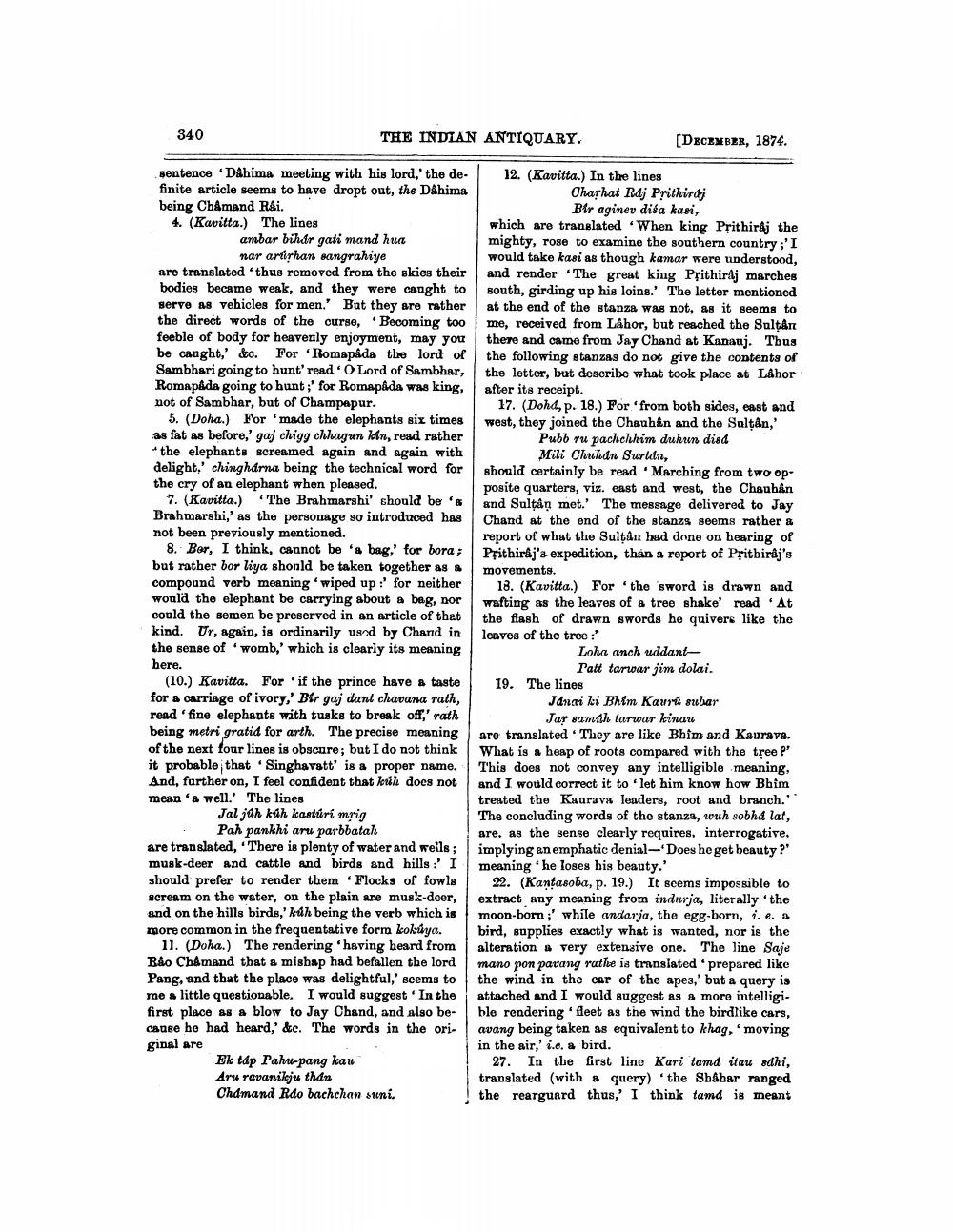________________ 340 THE INDIAN ANTIQUARY. [DECEMBER, 1874. sentence "Dahima meeting with his lord,' the de. 12. (Kavitta.) In the lines finite article seems to have dropt out, the Dahima Charhat Raj Prithiraj being Chamand Rai. Bir aginev disa kasi, 4. (Kavitta.) The lines which are translated "When king Prithiraj the ambar bihar gati mand hua mighty, rose to examine the southern country ;'I nar artirhan sangrahiye would take kasi as though kamar were understood, are translated thus removed from the skies their and render The great king Prithiraj marches bodies became weak, and they were caught to south, girding up his loins.' The letter mentioned serve as vehicles for men.' But they are rather at the end of the stanza was not, as it seems to the direct words of the curse, 'Becoming too me, received from Lahor, but reached the Sultan feeble of body for heavenly enjoyment, may you there and came from Jay Chand at Kananj. Thus be caught,' &c. For 'Romapada the lord of the following stanzas do not give the contents of Sambhari going to hunt read. O Lord of Sambhar, the letter, but describe what took place at Lahor Romapada going to hunt;' for Romapada was king, after its receipt. not of Sambhar, but of Champapur. 17. (Doha, p. 18.) For from both sides, east and 5. (Doha.) For 'made the elephants six times west, they joined the Chauhan and the Sultan,' as fat as before,' gaj chigg chhagun kin, read rather Pubb tu pachchhim duhun disd "the elephants screamed again and again with Mili Chuhan Surtan, delight,' chingharna being the technical word for should certainly be read Marching from two opthe cry of an elephant when pleased. posite quarters, viz. east and west, the Chauhan 7. (Kavitta.) The Brahmarshi' should be s and Sultan met.' The message delivered to Jay Brahmarshi,' as the personage so introduced has Chand at the end of the stanzs seems rather a not been previously mentioned. report of what the Sultan had done on hearing of 8. Bor, I think, cannot be 'a bag,' for bora ; Prithiraj's expedition, than a report of Prithiraj's but rather bor liya shonld be taken together as a movements. compound verb meaning 'wiped up :' for neither 18. (Kavitta.) For the 'sword is drawn and would the elephant be carrying about a bag, nor wafting as the leaves of a tree shake' read At could the semen be preserved in an article of that the flash of drawn swords he quivers like the kind. Ur, again, is ordinarily usod by Chand in leaves of the tree the sense of womb,' which is clearly its meaning Loha anch uddanthere. Patt tarwar jim dolai. (10.) Kavitta. For if the prince have a taste 19. The lines for a carriage of ivory,' Bir gaj dant chavana rath, Janai ki Bhim Kauru subar read 'fine elephants with tusks to break off,' rath Jar samih tarwar kinau being metri gratid for arth. The precise meaning are translated. They are like Bhim and Kaurava. of the next four lines is obscure; but I do not think What is a heap of roots compared with the tree?' it probable that Singhavatt' is a proper name. This does not convey any intelligible meaning, And, further on, I feel confident that kul does not and I would correct it to let him know how Bhim mean'& well.' The lines treated the Kaurava leaders, root and branch.' Jal juh kuh kasturi mrig The concluding words of the stanza, wuh sobhd lat, Pah pankhi aru parbbatah are, as the sense clearly requires, interrogative, are translated, .There is plenty of water and weils ; | implying an emphatic denial-Does he get beauty ?' musk-deer and cattle and birds and hills :' I meaning he loses his beauty.' should prefer to render them Flocks of fowls 22. (Kantasoba, p. 19.) It seems impossible to scream on the water, on the plain are musk-deer, extract any meaning from indurja, literally 'the and on the hills birds,' kuh being the verb which is moon-born ;' while andarja, the egg-born, i. e. a more common in the frequentative form kokuya. bird, supplies exactly what is wanted, nor is the 11. (Doha.) The rendering 'having heard from alteration & very extensive one. The line Saje Rao Chamand that a mishap had befallen the lord mano pon pavarg ratle is translated prepared like Pang, and that the place was delightful,' seems to the wind in the car of the apes,' but a query is me a little questionable. I would suggest. In the attached and I would suggest as a more intelligifirst place as a blow to Jay Chand, and also be ble rendering 'fleet as the wind the birdlike cars, cause he had heard,' &c. The words in the ori. avang being taken as equivalent to khag, moving ginal are in the air,' i.e. a bird. Ek tap Pahr-pang kaum 27. In the first line Kari tama itau sdhi, Aru ravanikju than translated (with a query) the Shahar ranged Chamand Rdo bachchan suni. the rearguard thus,' I think tamd is meant




